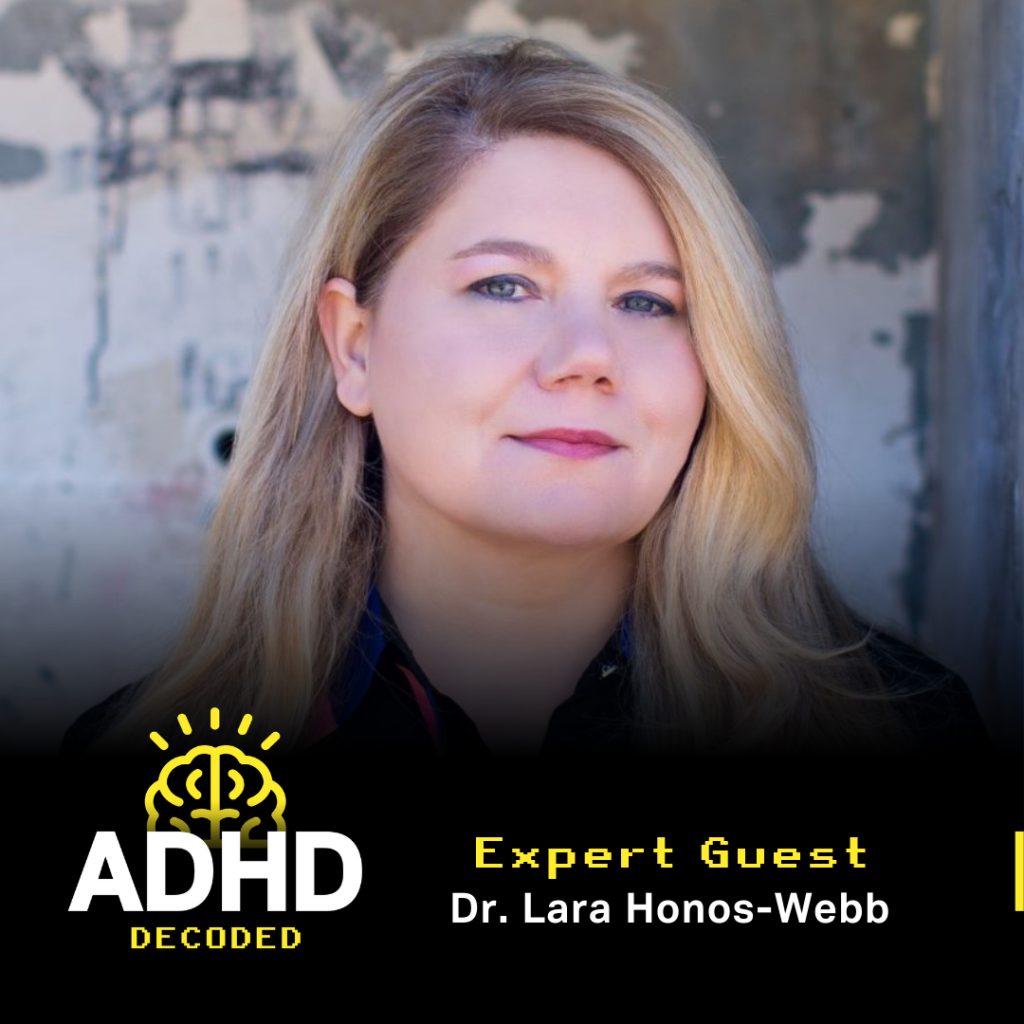On the fourth episode of the ADHD Decoded podcast, we decode ADHD Motivation. How does motivation work differently in the ADHD brain, why do we struggle with procrastination, and what hacks can we use to start and complete our projects?
To help us decode motivation, we interviewed clinical psychologist, worldwide ADHD expert and author Dr. Lara Honos-Webb.
Listen to the episode
Other ways to Listen:
Featured Expert: Dr Lara Honos-Webb

Episode Transcript
Amanda Fischer:
Hello everybody and welcome to the ADHD Decoded podcast, your roadmap to understanding the ADHD brain. Here we offer you brain hacks to inspire and empower you to take charge of your life, whether you are recently diagnosed, have been coping for years, think you might have ADHD, or are wanting to learn more about the ADHD brain in general. Then this podcast is for you. I am your host, Amanda Fischer, and this is brought to you by the Kaleidoscope Society.
Amanda Fischer:
In this episode, we will be decoding motivation. How does motivation work differently in the ADHD brain? Why do we struggle with procrastination, and what hacks can we use to get started and get things done?
Amanda Fischer:
To help us decode motivation we have invited clinical psychologist and ADHD expert, Dr Laura Honos-Webb.
Amanda Fischer:
All right, so let’s just jump right in. Why do ADHDers procrastinate and how is it different from neuro-typical procrastination?
Dr. Honos-Webb:
Well in terms of why do we procrastinate, we’ll connect it directly to the ADHD, and then I’d like to circle back and talk about the role that confidence plays in our motivation.
Dr. Honos-Webb:
In order to have a diagnosis of ADHD, by definition, a psychologist has to document what we call impairment and functioning. So what that means is that some people are going to procrastinate, but if you have a diagnosis of ADHD, it means that you procrastinate so much that you maybe have been put on probation at work. That it is very negatively impacting your relationships. That you’re not getting your assignments done in school and getting bad grades.
Dr. Honos-Webb:
So it is more extreme if you have ADHD. It’s more than other people and it impairs the quality of your life.
Dr. Honos-Webb:
Another reason that we procrastinate more has to do with brinksmanship. And so brinksmanship is this idea of putting yourself on the edge so that if you postpone writing that paper to the very last minute, then all of a sudden you have this rush of adrenaline and, “Oh my gosh, I’ve got to do this.” And so that adrenaline actually is very focusing and increases attention.
Dr. Honos-Webb:
And so some people use this brinksmanship to motivate them. That’s the least effective way to do it. And one of the funny stories I have in my practice is that… and how silly brinksmanship can be, is, I’ll have clients who are often very late, it’s pretty predictable.
Dr. Honos-Webb:
And I’ll have clients say stories like, “It’s funny because I was actually on my way here and I was completely on time, and I knew I could have gotten here easily and it would have been a smooth ride. And all of a sudden I said, ‘Oh I should stop and get gas.'” Or some of the people say, “I should stop and get coffee.”
Dr. Honos-Webb:
And this is a really good example of brinksmanship because if they do that, all of a sudden they have this adrenaline, and then they’ll say, “And then as soon as I got the coffee or I got the gas, I realized I was going to be late and I was really anxious.” So there is almost a seeking of brinksmanship.
Dr. Honos-Webb:
And I think another thing is if we’re disorganized, that’s another symptom of ADHD, which a person who doesn’t have ADHD might not have, it’s going to be a lot harder to get started if you can’t find your assignment. If you can’t find the things that you need to get started, everything is going to take longer. And getting started could be five to ten steps more than the other person.
Amanda Fischer:
Mm-hmm (affirmative). Absolutely. Are there ever any instances where procrastination isn’t always bad? Are there ever any advantages to procrastination?
Dr. Honos-Webb:
Well, it can be in the sense that if you observe your procrastination, and you would take a step back and say, “What are these things that I’m really, really procrastinating on?” What it will help you do is to identify your priorities. Meaning… so for example, let’s say that one of your goals was that you were going to go to the gym and get on a treadmill for half hour, and that you just never did that. And it may be, for example, that that is not a priority.
Dr. Honos-Webb:
And you can do some problem solution around that. So for example, you could say… this would be an example of flexible thinking that you could bring to it, “What are some other ways to stay healthy? It is a priority for me to stay healthy, but for some reason this idea of going to a treadmill doesn’t seem a priority for me.”
Dr. Honos-Webb:
So then the flexible thinking comes in and you could say, “Well, I could go to a dance class or I could go for a hike or I could go with some friends.” Let’s bring the whole friend social support element into it. Again, it helps you to problem solve and realize what are your real priorities.
Dr. Honos-Webb:
And so, you notice the things that you consistently are not doing, then you do some problem solving and use some flexible thinking to solve those problems.
Amanda Fischer:
Yes, absolutely. Okay, so I love the brain hack in your book where you talk about confronting the tiger and relating that to procrastination. Could you talk a little bit more about that?
Dr. Honos-Webb:
Yes. So the idea is, let’s say you had a tiger… it’s a silly example, but it makes it a little bit more memorable, is that if you had a tiger in your backyard, you would have to watch it very carefully.
Dr. Honos-Webb:
This is a little bit what I was talking about with how you can use procrastination to figure out your priorities, is you have to observe it very closely. Like, what time of the day is it sleeping? Maybe I can go out and do something in my backyard. Or when does it need to be fed?
Dr. Honos-Webb:
And so if you take that same approach to your procrastination, you think of it as a tiger, and you’re watching it carefully and you’re figuring out how does this work, that it’s going to give you a lot of information. So again, you’re going to figure out what are the things you consistently are procrastinating on. And it gives you a strategy for trying to do some problem solving or getting clarity about what your priorities are.
Dr. Honos-Webb:
The other way it can help is that as you observe your procrastination, you might want to say, “Wait a minute, what are the benefits of all this procrastination?” As you get really clear and you study it, and again, it’s one of those questions, it might even be almost a joke. Like actually there’s really not any benefits to procrastinating.
Dr. Honos-Webb:
And then you say, “Well, what are the costs to procrastinating?” And that can be a very painful question because it could be, “I lost a job.” “I’m getting bad grades.” “I’m ruining my relationships. People are constantly offended that I’m not doing what I said I would do, and it’s affecting all my relationships.”
Dr. Honos-Webb:
And so once you began to look at those elements of it, they can again become solvable.
Dr. Honos-Webb:
And I think a really big point about procrastination, if you study it, there’s one big headline I want you to take away. It’s the relationship between confidence and motivation. So for example, what the implication here is one of your goals should be to increase your confidence to the highest level possible.
Dr. Honos-Webb:
And this is the basis of all my work on the gift of ADHD. Because think about it, when I work with people, and again, I use this observation of the procrastination as part of my treatment. I will say, “Okay, as you’re sitting there and you have that work to do and you know you have to do it, what stops you from getting started?” So often the answer is the person thinks to themselves, I can’t do it.
Dr. Honos-Webb:
And do you understand how that thought right there, that negative thought directly impacts your willingness to get started. And what if you felt like I owe it to humanity to get started on this because I need to get good grades. And if I get good grades I can go be a doctor and save people or whatever that might be for you.
Dr. Honos-Webb:
And so you can flip that on its head if you have the motivation that you have a lot to offer and that you’re capable of doing this.
Dr. Honos-Webb:
And so we can transition a little bit into talking about how do you boost that motivation in terms of your level of confidence is directly going to be related to how motivated you are.
Amanda Fischer:
I find a lot of times that… for example, I’ll wake up in the morning, I know all the things I have to get done that day and it just seems so overwhelming to complete and accomplish all of those tasks.
Amanda Fischer:
And I think another thing that can be really helpful is going back to confronting the tiger. And I think, prioritizing like you’ve been saying, what you need to do, and even just writing those things down, just taking it one thing at a time.
Amanda Fischer:
I think it’s something as simple even as making your bag can just set the tone for your day. And so it’s just taking one thing at a time, because I think ADHDers have a tendency to just get so overwhelmed and feel those really intense feelings of being overwhelmed.
Dr. Honos-Webb:
Yes. And that’s why… you talked about my next book that’s coming out on the six super skills. And it directly relates to prioritizing in this way and motivation in this way, which is the number one super skill is finding your gifts, because you need that level of confidence to have a level of motivation to not procrastinate.
Dr. Honos-Webb:
But the second super skill is setting goals. And the reason is that goals are planning and planning is an executive function. And goals direct your attention, but you can also then have these built in rewards if you make the habit of tracking the progress.
Dr. Honos-Webb:
So if you set a goal to make your bed every day and then you note that, “Oh, I made my bed every day, this whole week.” You have this sense of progress that boosts your confidence. It gives you a sense of being able to do what you want.
Dr. Honos-Webb:
And so, by setting the goals, you figure out what are your priorities.
Dr. Honos-Webb:
And, the third super skill is to chunk those goals down into the next stepping stone. So let’s say whatever your goal might be, it might be to get an A in a class. It may be then that one small chunk of that would be to make a commitment that you’re going to go talk to your teacher whenever you have any questions. Or you just want to get some… again this idea of social support, and some guidance, and some information and seeking someone that can help you with that.
Amanda Fischer:
So I think it’s something we’ve already been talking about, the power of goal setting. Are there any other practical tips and brain hacks that you can offer our listeners in terms of goal setting?
Dr. Honos-Webb:
I think in terms of goal setting, you want to make them specific and actionable. So for example, let’s say you were going to a social event or let’s say you were going to a new work setting and you wouldn’t want your goal to be, “I really want to be popular.” Because what does that even mean? How do you know if you’ve achieved that? What if all the popular people are not people you’d want to be friends with?
Dr. Honos-Webb:
So, a specific goal for example would be “I’m going to…” whether it be going to a party or going to a class or going to a work setting, “I’m going to introduce myself to someone new every single day.” Or if it’s a party, “I’m going to introduce myself to three new people.”
Dr. Honos-Webb:
So that would be examples of setting very specific goals.
Dr. Honos-Webb:
And the other way I think that it can help is to boost your motivation. I think that combining all these tools in terms of not only being specific but being actionable and realistic, all of those are going to be really helpful.
Dr. Honos-Webb:
And also the idea of putting in some extra time to build your confidence to achieve that goal. Because again, one of the things I see over and over, like, “Why didn’t you take that action?” And they’ll be, “I didn’t feel like I could.”
Dr. Honos-Webb:
This is the hidden part of ADHD that is not spoken about enough, is that we have a label that says deficit disorder, but it was required for us to have confidence to have that motivation and to set goals.
Dr. Honos-Webb:
What if you didn’t have confidence, and you said, “Oh my goal is to pass all my classes.” And for some people that might be realistic, but it may be you’re capable of more and you should set higher goals.
Dr. Honos-Webb:
So, finding gifts is always going to be a really important step in goal setting and motivation.
Amanda Fischer:
Mm-hmm (affirmative). So what’s a way that our listeners could go about identifying their gifts?
Dr. Honos-Webb:
Let’s turn around some of the questions. We always… you could just imagine people go, “Oh, what went wrong? How did I get here?” What if at the end of every day you said, “What went right today?” And you really made a point of noticing that and figuring that out.
Dr. Honos-Webb:
Or even something like thinking about a time when you felt loved. And I will just give you a simple to do. Go ask three people you know to tell you what three adjectives describe your greatest gifts. And then flip that on its head, and… by the way, find three people and go tell them what you see as their gifts. We can care for the people around us too, and boost everybody’s motivation and goal setting.
Dr. Honos-Webb:
The other thing is, there’s so much research that actually happiness increases attention. I mean, one study found that if you gave physicians even something as simple as a lollipop, they were more accurate in making diagnoses. It increases attention to think of the times you felt loved.
Dr. Honos-Webb:
And then, even for yourself, to focus on your gifts, which could mean, very simple, to drag your attention to what you did right. And again, what are the three adjectives? You can ask yourself, what are the five biggest successes I have had in life? And it will remind you of what those gifts are.
Dr. Honos-Webb:
And when you’re looking at something, and again, in real time, what ADHD looks like a lot of times is, you know you have to do something and there’s this voice in your head that is saying, “I can’t do it.”
Dr. Honos-Webb:
This one goes directly to that self-talk, is to say, “What are five reasons I can make this work?” “What are five reasons I can do this?” And as you do that, you’re challenging those voices.
Dr. Honos-Webb:
And so that also leads us to the importance of self-talk, how important it is, what we say to yourself, and you can say, “I can do this. I’ve done it before, here’s my track record of successes.” Think of a time where you had success with it before. All of that is going to be very key to boosting your motivation and setting goals. And getting goals, I should say. Getting goals is important too in addition to setting goals.
Amanda Fischer:
Yes. What it all boils down to is just being compassionate towards ourselves and reversing that self-talk, and saying, “No, I can do this.” And I think as ADHDers we get so hard on ourselves, I know what that’s like first hand. We can be our own worst enemy.
Amanda Fischer:
That’s all the reason why we need to affirm ourselves, what we’re doing right. And also tell our loved ones that we need to hear those words of affirmation, because all day everyday we can have the tendency to just beat ourselves up.
Amanda Fischer:
I think what you’re saying is so essential to building up that motivation over time, in order to have that motivation initially, we need to feel good about ourselves.
Amanda Fischer:
So yes. Thank you so much, Dr Honos-Webb for your time and your expertise. I’m sure it was so, so very helpful for our listeners. So thank you so much.
Dr. Honos-Webb:
Thank you so much, Amanda. You’re doing a great job.
Amanda Fischer:
Thank you for tuning in to the ADHD Decoded podcast brought to you by The Kaleidoscope Society.
This is your host, Amanda Fischer. Until next time.




